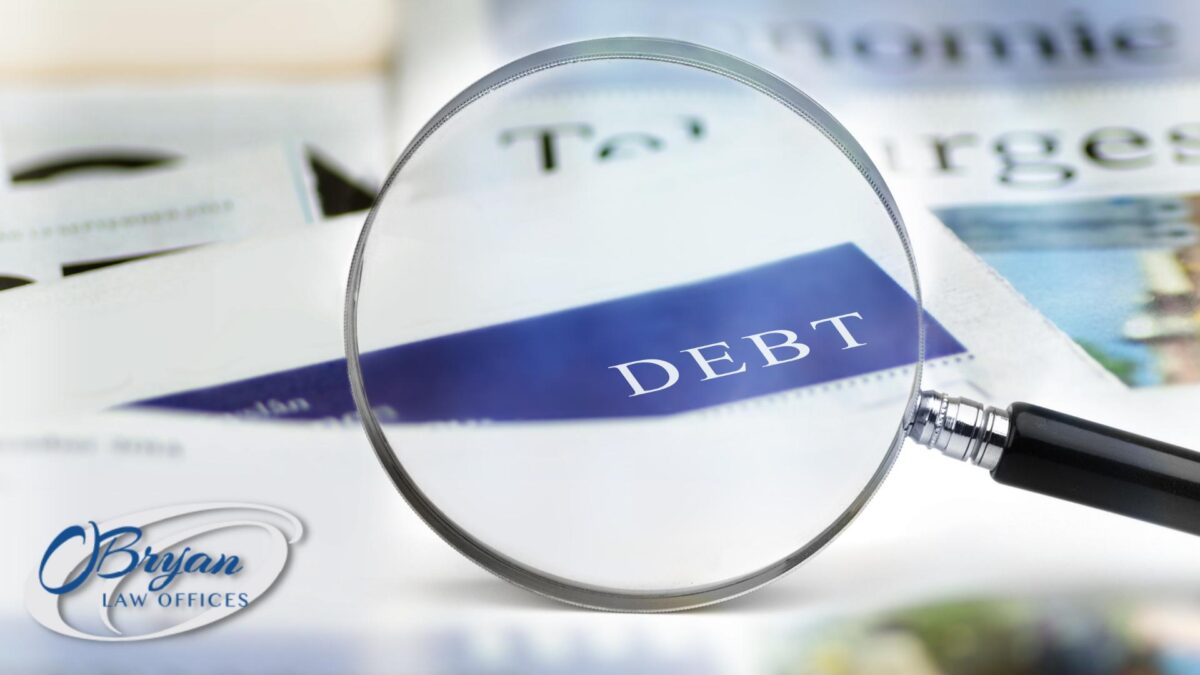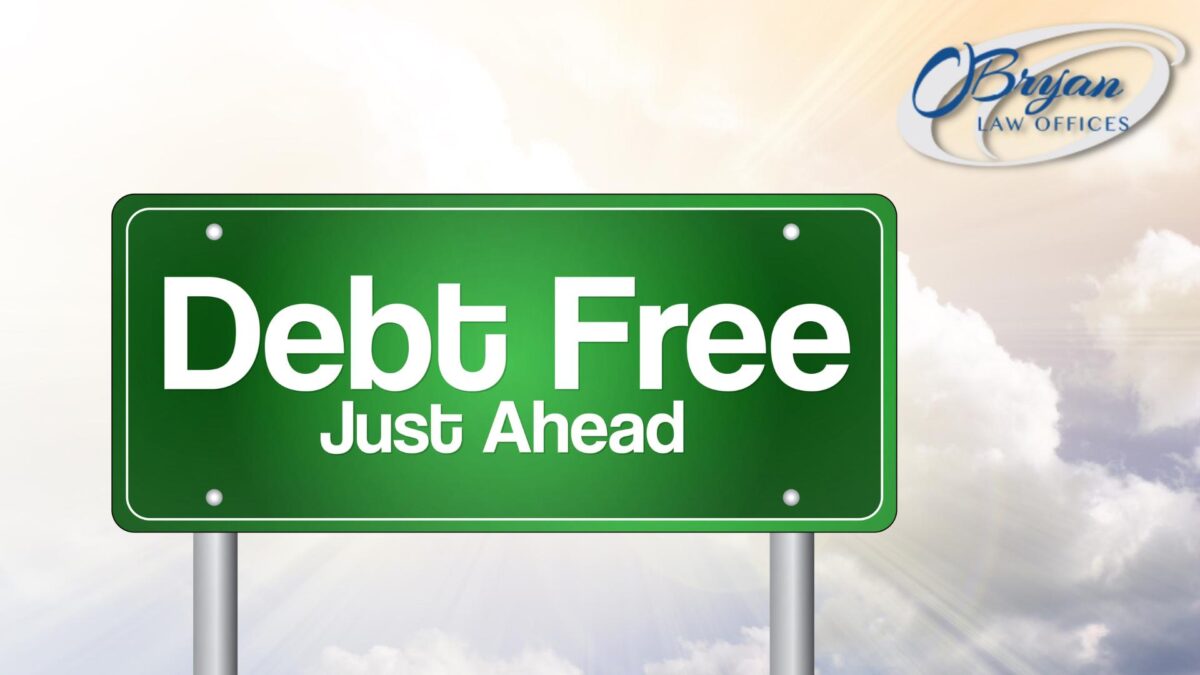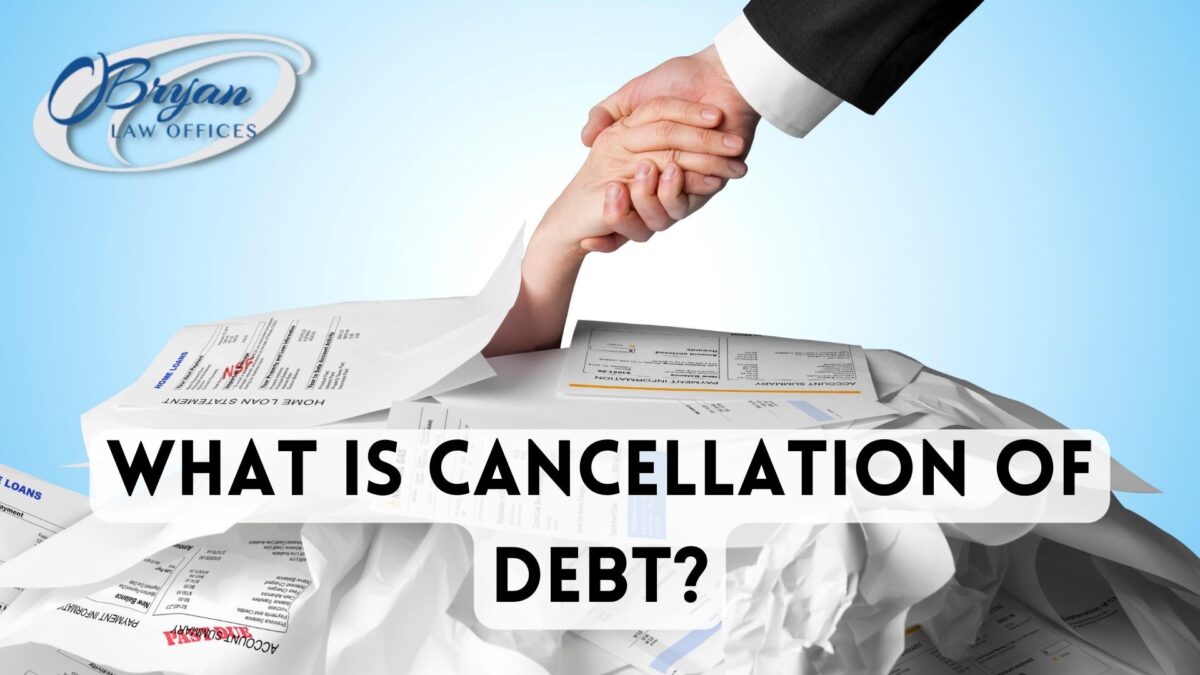When you’re struggling with making payments on loans, it can feel like there’s no end in sight. Many borrowers don’t have much wiggle room and can get into a financial bind if they experience a medical emergency or lose their jobs. If you’ve heard the phrase “cancellation of debt,” you may think it’s a miracle and a way for you to achieve some financial relief.
However, being approved for canceled debt can be difficult. Many third parties offering canceled debt services can scam borrowers out of their hard-earned money and worsen their financial situation. If you’re struggling with paying off debts and need some relief, the attorneys at the O’Bryan Law Offices are ready to help.
While bankruptcy may sound scary, it’s the best way for those struggling with finances to get some relief. Our experienced attorneys have helped over 30,000 families get a fresh start with their finances and are prepared to do the same for you. To schedule a free consultation with one of our bankruptcy attorneys, contact our law office at 502-339-0222 today.
Cancellation of Debt Definition
Cancellation of debt, or debt cancellation, is when a lender releases the borrower from their debt obligation and discharges the debts owed. Borrowers may be able to negotiate with their lender for cancellation of debt. Borrowers can also get their debts canceled by filing for bankruptcy or working with a debt relief program.
What Is Form 1099-C?
Form 1099-C is the documentation the Internal Revenue Service (IRS) requires that borrowers complete when a debtor cancels their debts. Borrowers are required to report canceled debt that is over $600 to the IRS.
Your lender will file the 1099-C and send you a copy of the form so that you can file it with your taxes. The IRS only excludes certain debts, so you may owe debt forgiveness taxes if your debt doesn’t fall under their exclusions. The canceled debt income will be listed on your tax return if your debt is not excluded.
What Debts Can Be Listed on a 1099-C?
Not all canceled debts require a 1099-C. The most common debts that your lender will file a 1099-C for are:
- Foreclosures
- Abandonment of property
- Repossession
- Return of property to the lender
- Loan modification for a principal residence
- Resolution of credit card debt
Debt Cancellation vs. Debt Settlement

Cancellation of debt income and a debt settlement agreement are both options for borrowers struggling to keep making payments on their loans. A canceled debt occurs when a lender either discharges or forgives some or all of the debt owed.
A debt settlement is a process that a borrower can attempt with their lender to agree on a lump sum payment that will result in the forgiveness of the remaining debt. This option can significantly affect a person’s credit score, especially if they’re already struggling financially.
Debt settlement companies can often take advantage of desperate individuals in such a vulnerable state, so a debt settlement is an extremely risky option for those trying to resolve their debts.
The O’Bryan Law Offices do not offer debt settlement and only provide safer options with legal protections for clients seeking to remedy their debt issues.
How Does Debt Cancellation Work?
Individuals may attempt a debt cancellation to get their debt forgiven or discharged by their lender. Borrowers can get the entire debt canceled or a portion of the remaining debt canceled. Debt cancellation typically occurs in conjunction with loan forgiveness programs.
One example is the income-driven education loan repayment plans that the U.S. Department of Education offers federal student loan borrowers. According to this student loan forgiveness plan, borrowers may repay their student loans for 20 to 25 years. Once the repayment terms have been met, the student’s remaining debt will be forgiven.
How to Get a Debt Cancellation
There are several different ways that a borrower can get their debt canceled. The Kentucky bankruptcy attorneys at the O’Bryan Law Offices will list the different ways below that borrowers can attempt to get a cancellation of debt.
Negotiate With Your Creditors
Negotiating with your creditor for cancellation of debt is an option for borrowers who are struggling with making payments on their loans. However, this can be challenging since creditors want their money. Many lenders will include a canceled debt stipulation in their loan agreement.
Some loans have better chances of being canceled or forgiven, like loans issued under government programs. Some loans, like mortgages and student loans, may qualify for debt cancellations as part of government-sponsored relief programs.
Why Would a Creditor Agree to Debt Cancellation?
Creditors may be willing to negotiate a canceled debt since they’ll at least get some payment for the loan instead of no payment. If a borrower can prove they’re experiencing financial hardship, like the loss of a job or medical emergency, the lender may consider a canceled debt with a small fee attached.
It’s essential to be open and honest with your creditors about your financial situation, as they’re more open to working with you if they know what’s going on. If you can show them that you can only pay some of the debt owed, they may be more likely to agree to canceled debt since they will get some of their money back.
If the loan you’re attempting to get canceled is a mortgage, your lender may be willing to work with you on a principal reduction of the loan that decreases the amount of debt owed. Lenders will often agree to a principal reduction to collect some money on the outstanding debt and avoid filing a foreclosure on the property.
Debt Relief Programs
Debt relief programs are another option if you’re looking for debt cancellation. Many provide credit counseling resources to help people struggling to pay their debts.
Similar to debt settlement companies, debt relief programs can sometimes hurt a person’s finances more than help them. When an individual signs up for a debt relief program, they will be required to stop payment on their debt to increase their chances of the creditor agreeing to a canceled debt. When borrowers stop paying for any debt, they can put themselves in a deeper financial hole if the lender doesn’t agree to cancel the debt.
While the O’Bryan Law Offices is not a debt relief program, our attorneys can help you find debt relief through the Bankruptcy Code.
Filing for Bankruptcy

Many individuals behind on debts want to avoid filing for bankruptcy as much as possible. Unfortunately, filing for bankruptcy is often the best option for people who need help paying their loans. Other debt relief options can be dangerous and don’t usually have the borrower’s best interest in mind. Bankruptcy provides debt relief for many individuals and allows them to manage their finances while paying off their debts.
The most common bankruptcy filings for individuals are Chapter 7 and Chapter 13. A Chapter 7 bankruptcy will liquidate a person’s assets to pay off their debts to full or partial satisfaction. During Chapter 7, many individuals lose their homes and other hard-earned assets due to liquidation.
On the other hand, a Chapter 13 bankruptcy can help you keep your home and vehicles. During Chapter 13, individuals agree to a repayment plan with their lenders to pay off their debts. This bankruptcy filing can last for three to five years.
How Will Canceled Debt Affect My Taxable Income?
Before canceling a debt, you should learn if it qualifies as taxable income. If the canceled debt qualifies, you could owe a lot in taxes. If the IRS considers the canceled debt as taxable income, you’ll need to report it on your tax return for the year when the cancellation occurred.
Your lender should file a 1099-C form for debt forgiveness and send you a copy of the form for your personal filings. This form is filed for debts the IRS considers taxable and any canceled debt over $600.
Debt Cancellation Exceptions
There are some debts that the IRS does not consider taxable income. If any of your debts fall under the categories below, you won’t have to include them in your gross income.
- Bankruptcy
- Certain qualified student loans
- Some educational student loans or relief programs that provide health services
- Canceled debt that would be deductible if a cash basis taxpayer paid it
- Student loan discharges following the death or permanent disability of the student
- under the Home Affordable Modification Program
In addition to the above exceptions, the IRS considers the following canceled debts as income but does not require them to be reported as income.
- Extent insolvent cancellation
- Qualified farm indebtedness cancellation
- Canceled debt from a Title 11 bankruptcy
- Cancellation of qualified principal residence indebtedness
- Cancellation of qualified real property business indebtedness
Qualified Purchase Price Reduction
Another exception is a qualified price reduction that the seller provides. Suppose the property seller reduces the debt owed for the property before you’re considered insolvent, and the reduction is not the result of a bankruptcy filing. In that case, the reduction does not qualify under cancellation of debt income. Once this reduction occurs, you must decrease your tax basis in the property equal to the seller’s debt reduction amount.
Is Cancellation of Debt a Good or Bad Idea?

While canceled debt may sound like a great way to remedy your dire financial situation, it can negatively affect borrowers. Many debts fall under taxable income and can result in high amounts of owed taxes, negating the whole point of canceling your debts.
As we’ve also mentioned, debt settlement companies and other debt relief agencies can be breeding grounds for shady dealings that can hurt a person’s financial situation even more. Many of these companies offer “get out of debt quick” plans that can take a person’s money without providing any actual assistance. If a debt relief company offers a program that sounds too good to be true, it most likely is.
Does Debt Cancellation Impact Your Credit Score?
A canceled debt usually only affects your credit score if the cancellation results from a bankruptcy filing.
Contact O’Bryan Law Offices Today to Explore Your Options

If you’re struggling with making payments on your loan, the attorneys at the O’Bryan Law Offices are here to help. Before you attempt a cancellation of debt or debt settlement, contact our law firm first. We can evaluate your finances and determine the best course of action for you.
And don’t be afraid of that ten-letter word: bankruptcy. Filing for bankruptcy is a great way to alleviate your debts and get your finances back on track. To schedule a free consultation with one of our experienced bankruptcy attorneys, contact the O’Bryan Law Offices at 502-339-0222 today.







